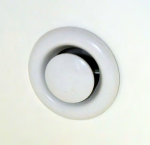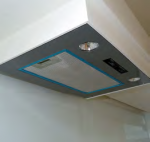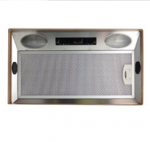Ventilation
Background ventilation
The apartment is equipped with a mechanical ventilation system which gently removes stale and moisture-laden air from the bathroom and kitchen areas, through ventilation points located on the walls (Image 1). The system is powered by a fan unit which constantly draws air through the ventilation grilles and expels it through ducting connected into the communal extract system, which discharges the air at roof level. The fan unit is mounted at high level (location varies depending on the apartment type). To maintain minimum ventilation, the main power to the fan unit should be kept permanently on.
Any intrusion of neighbours' cooking or other smells can usually be alleviated by turning on the ventilation system to prevent back draught coming into your flat.
Care and maintenance instructions
To avoid the build up of dust, which can impede the operation of the fan and in severe cases lead to overheating, the filter should be inspected and cleaned every six months. To clean the filter, remove it from the unit and wash it in tepid water using a mild detergent. Shake out the excess water and allow the filter to dry naturally before replacing it in the unit.
Servicing the ventilation unit
The ventilation system has been commissioned by the installer to run efficiently and should only be serviced or adjusted by a competent person. For safety, prior to any maintenance work being carried out, the power supply to the fan units should be switched off and isolated at the consumer unit.
Cooker hood
Kitchens are fitted with an electric re-circulating extractor hood to remove cooking smells (Images 2 and 3). The extractor has an integral light and a boost facility. The extractor filter should be cleaned regularly and be replaced in accordance to the manufacturer’s guidance provided for Baumatic or Caple brand hoods.


